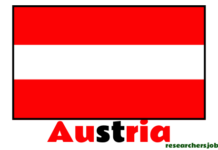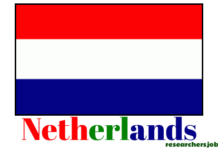Designation/Position- Full DAAD PhD scholarship

University of Potsdam, Germany invites application for Full DAAD PhD scholarship position for candidates at the Institute of Earth and Environmental Sciences of University of Potsdam, Germany for a period of three years.
About- Funded by the Graduate School Scholarship Programme (GSSP) of the German Academic Exchange Service (DAAD), the NatRiskChange Research Training Group now offers a full DAAD PhD scholarship at the Institute of Earth and Environmental Sciences of University of Potsdam, Germany for a period of three years (or up to four years for candidates from developing or emerging countries).
Volcanic tremor has been identified as a very special seismic signal which seems highly correlated to internal volcanic processes at active volcanoes, i.e. magma movement, fluid flow or repeated failure of rocks. Volcanic tremor thus represents the most valuable source of information when trying to understand the physics of the forces driving volcanic eruptions. The continuous observation of volcanic tremor characteristics therefore reveals the evolution of the internal volcanic activity status and thus may be helpful in identifying seismic signal patterns that can be seen as precursor of major catastrophic volcanic events. The continuous characterization of tremor signals as recorded by seismic networks in the surrounding of active volcanoes still poses a major challenge to analysts and automatized approaches are required to enable a full and consistent record of event evolution.
Within the PhD topic the candidate is expected to go beyond classical signal analysis techniques usually employed in seismology by exploiting similarities of seismic and acoustic signals and build the information retrieval strategy on the expertise developed in the field of music information retrieval and audio signal processing. The goal is to develop an innovative seismological data processing scheme for volcanic tremor for the purpose of seismological monitoring and understanding the underlying physical source processes. This project is closely connected to PhD-Project I7 allowing for the exchange and joining of research ideas/concepts.
Research/Job area– Geophysics, physics, digital signal processing, computer science or a closely related subject
Project Title- Volcanic Tremor analysis based on advanced signal processing concepts including music information retrieval (MIR) strategies
Location- University of Potsdam, Germany
Eligibility/Qualification- Research group is seeking applications from highly motivated individuals with a diploma/master degree in geophysics, physics, digital signal processing, computer science or a closely related subject. Fluency in the English language (speaking and writing) as well as the willingness to work in an interdisciplinary team are essential. Experience with time series analysis and programming as well as an understanding of relevant physical mechanisms in the project context are desired skills.
Job/Position Description- Today’s seismological station networks at active volcanoes record ground-motions continuously. This continuous recording is needed for monitoring indirectly the volcanic activity from the seismic background activity. In oder to assess the evolution of an volcanic crisis it is essential to filter this huge amount of data automatically for the information related to volcanic processes, in particular for volcanic tremor signals. Expert classification by visual control is in general difficult considering the amount of data. Further it is unclear what level of consistency in time can be expected from such an analysis/classification process from an individual or a group of observers. The aim of this project is to develop new strategies for identifying, extracting and validating the records of interest from a seismic network at active volcanoes. Once reliable extraction schemes are established, the level of scientific information with respect to their underlying source processes need to be assessed and validated.
Very similar issues (data reduction, extraction and classification) are addressed in the field of audio signal processing (ASP) or in the context of music information retrieval (MIR). Further the signal characteristics of acoustic and seismic recordings comprise a number of similarities. The PhD candidate is expected to introduce promising strategies and methods from ASP and MIR communities into a seismological processing scheme that deem to be potentially useful for the seismological community.
The PhD student will be based at the research teams “General Geophysics” of the University of Potsdam. He/she is expected to participate in group seminars and research activities within the graduate school as well as in teaching activities in undergraduate level.
The scholarship includes
- a monthly rate of 1000 Euro
- travel support and potential support for studies and research
- combined insurance (health, accident, liability)
- potential support for rent, or family allowance
The selected candidate will be fully integrated in the activities and the teaching curriculum of the NatRiskChange Research Training Group, and enjoy the vibrant international research environment in the Institute of Earth and Environmental Science at the University of Potsdam, located around 40 km from the center of Berlin. The schedule and length of the language course will be determined after consultation with the selected candidates.At the time when DAAD receives the nomination letter, applicants must not have resided in Germany for more than 15 months prior to the nomination.
How to Apply- Applications should include the following components: a detailed CV, a letter of motivation, a brief research concept (approx. 2 pages) for the PhD project (focussing on a plan on how to use audio signal processing concepts for seismic signal analysis), a record of studies, master and bachelor certificates including a transcript of records, an English synopsis of the Master thesis, a list of publications, oral and/or poster presentations at conferences, and two letters of recommendation. The files should be sent, by e-mail, in one single PDF document (< 10 MB)to Dr. Theresia Petrow (natrisk@uni-potsdam.de) by May 20 th, 2018.
Based on the applications, the University of Potsdam will, in a first stage, nominate two to four candidates. These candidates will be required to submit a full application to the DAAD which will then, in a second stage, be evaluated by DAAD. Candidates will be informed in detail about the second stage in case they are nominated after the first stage. The actual scholarship and the related PhD study are envisaged to start in October 2018.
Handicapped applicants will be given preference in case of equal suitability. The NatRiskChange consortium strives to increase the proportion of women in research and specifically encourages females to apply for these positions.








